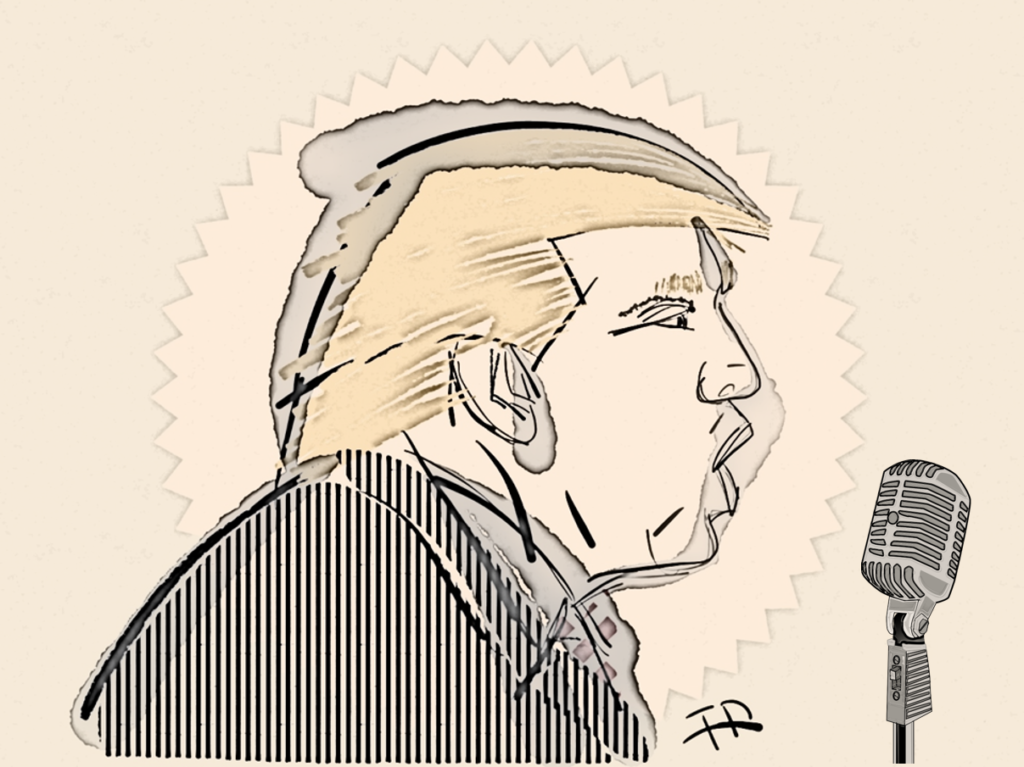
At long last, things in the world of politics are moving. The impeachment trial seems like it’s headed toward a conclusion, and the much-awaited Iowa Caucuses are happening today. Millions of dollars are being spent, strategists and consultants are scrambling, and consumer research is being conducted non-stop.
But then there are the campaign tactics, designed to capture attention, steal the spotlight, and make a lot of noise. If that sounds a lot like what we do all the time in radio, we’re on the same track. Sure, politicians have more money and staffers than radio programmers. They’re also making multiple appearances a day, fighting for precious minutes on network and cable TV, and doing whatever they can to shake hands, pat backs, and kiss babies.
I realize today’s blog post headline reads a lot like a Radio Ink story – but in fact, there are similarities between the machinations political campaigns go through and the strategies behind successful radio brands. Of course, there are differences, too.
As Larry Rosin of Edison Research (yes, they’re the company that does radio studies, but they also conduct the exit polls the news networks share throughout the primaries and general election) once told me, politics is a zero-sum game. That is, you either come in first – and win the seat – or you’re at home watching it on TV. Kinda like the Super Bowl.
In the primaries, second and even third-place finishers may still be in the game, but ultimately, there’s only one nominee from each party, and only a single winner for political office. Unlike in radio – where perhaps you can finish #3 Adults 18-49 in prime, and make a nice living – political contests are much more dog eat dog. And in fact, events like the Iowa Caucuses are like the Super Bowl – everyone’s watching, and the money and effort being poured into the outcome is staggering.
That’s why there’s so much to be learned by watching the candidates and their teams play the game, move the pieces on the board, spend their 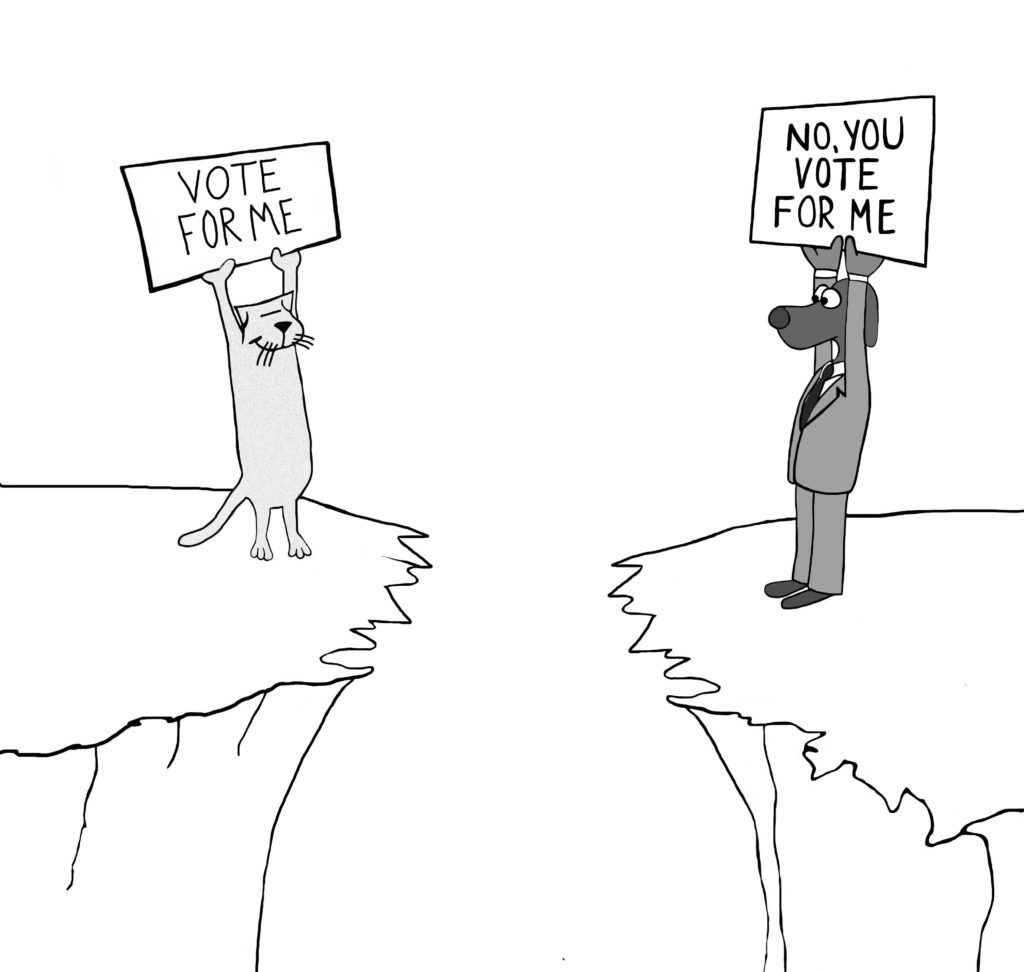 funds, and decide where to place their bets. Every day on the campaign trail – no matter who you’re rooting for – you see the gaffes, the tactical errors, the strokes of genius, and the moves that keep us talking over coffee or dinner.
funds, and decide where to place their bets. Every day on the campaign trail – no matter who you’re rooting for – you see the gaffes, the tactical errors, the strokes of genius, and the moves that keep us talking over coffee or dinner.
These politicians and their teams are challenged every day with making the right decisions – often on the fly or in real time. The news cycle is moving so swiftly that instincts and reaction time are everything. Making the right call – often under the gun – is the key, but only the best can pull it off.
Just like program directors.
So often, radio stations are challenged when a major concert comes to town, or there’s a big event happening in the community. How can you ensure presence in these target rich situations – even if you’re not sponsoring it or your competitor is?
That’s what that group of Democratic Senators has endured. During the impeachment trial, they’ve been tethered to D.C., miles away from the pre-caucus action taking place throughout Iowa. How do you retain presence in a place when you’re physically somewhere else? That’s the challenge, and the solutions have strong application for radio.
Here are my awards for the smartest strategic and tactical moves made by the various candidates in recent days as we’ve approached crunch time:
Stealing The Thunder Award – Maybe the best counter-programming move of the year, a MAGA rally in Des Moines last Thursday was a well-timed 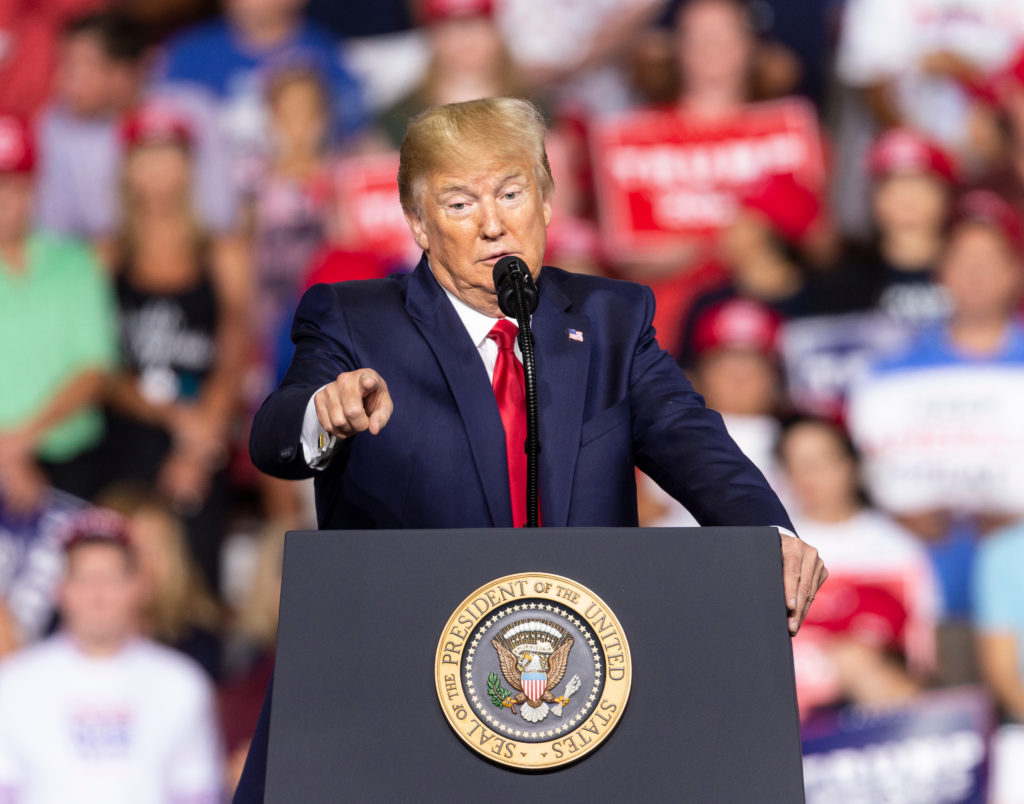 event designed to recapture (OK, steal) the energy from the Democrats. President Trump is one of the best ever at inserting himself in situations where he doesn’t really belong.
event designed to recapture (OK, steal) the energy from the Democrats. President Trump is one of the best ever at inserting himself in situations where he doesn’t really belong.
Today, it’s being reported Trump will have 80 surrogates on the ground in the Hawkeye State, ensuring ongoing news coverage.
In the past, the incumbent President might have opted to steer clear of this primary hotbed. But in this highly charged environment, it’s about capturing attention, and Trump is playing hard.
Drunken Sailor Award – Hands down, it’s Michael Bloomberg (although Tom Steyer is literally giving the former NYC mayor a good run for his money). NBC News reports that before all is said and done, Bloomberg could spend $1 billion (or more) in his quest to topple Trump.
Actually, on second thought, there’s no lesson here for anyone in radio. Gone are the days when companies provided gobs of marketing money to launch and promote radio brands.
You have to spend a lot of “Dead Presidents” to become the real thing, and eventually become the occupant in the White House.
The Wee Willie Keeler Award – The old time ballplayer was famous for the quote, “Hit ’em where they ain’t.” Finding ways to score in areas where the other candidates don’t choose to compete can put numbers up on the board. Again, chalk one up for the President.
A Wall Street Journal story last week by Catherine Lucey – “Trump Campaign Works to Garner Local News Coverage” – walked readers through the 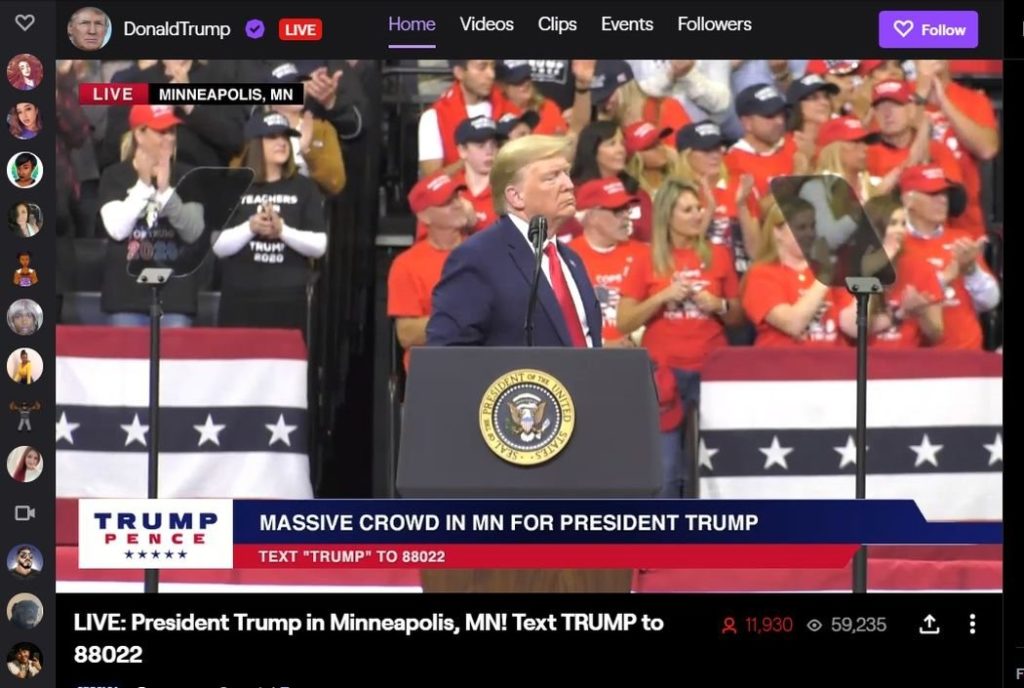 ways in which the Trump team uses spokespeople and staged events before and after his rallies to reinforce his message.
ways in which the Trump team uses spokespeople and staged events before and after his rallies to reinforce his message.
And the campaign has turned to less frequently used outlets – local radio, TV, and newspapers in the form of interviews with surrogates on these local media platforms. Smart.
Trump (and Bernie Sanders) are also on Twitch – a strategy designed to score with young Americans. that’s an interesting for two of the oldest candidates in the race. As we learned in 2016, it can be the states and/or demographic groups other candidates ignore that can be the difference between winning and losing.
Go Big Or Go Home Award – But then there’s the other end of the spectrum – Super Bowl ads. And in between the chips and salsa, and the cold beverages, you might have seen TV spots for both Trump and Michael Bloomberg – the first time ever (but surely not the last) candidates will shell out millions for an opportunity to be seen and heard in the “Big Game.”
In fact, these ads ran an estimated $10 million a pop, and you can bet there were no discounts for either candidate. When you’ve got upwards of 98 million viewers watching the game – many of whom are actually paying attention to the commercials – it’s a big avail that can pay off. Sometimes, you have to write the big check if you want to be heard.
Bloomberg’s ad used storytelling to support one of his core themes – gun legislation:
The President’s campaign was more focused on his trumpeting his accomplishments:
Pets R Us Award – Politicians and radio personalities aren’t always popular. But dogs and cats are. Smart radio stations have launched pet-centric  promotions – and they often work because nearly half of Americans have a dog, while about three in ten have cats. Pets bring out our human side, and while most every candidate (sans Trump) has a dog, Elizabeth Warren has used hers – Bailey – to perfection.
promotions – and they often work because nearly half of Americans have a dog, while about three in ten have cats. Pets bring out our human side, and while most every candidate (sans Trump) has a dog, Elizabeth Warren has used hers – Bailey – to perfection.
While Warren was one of those 100 jurors in Washington, Bailey – described as her “campaign furrogate” – was on the stump, making appearances, hanging out, and eating treats. And the good news is that dogs never put their paw in their mouth. Bailey actually has a Twitter page, created and administered by a Warren fan – @FirstDogBailey. And don’t laugh – Bailey has more than three times as many followers as I do.
Rear-View Mirror Award – In radio and in politics, nostalgia has appeal. And there’s no better practitioner than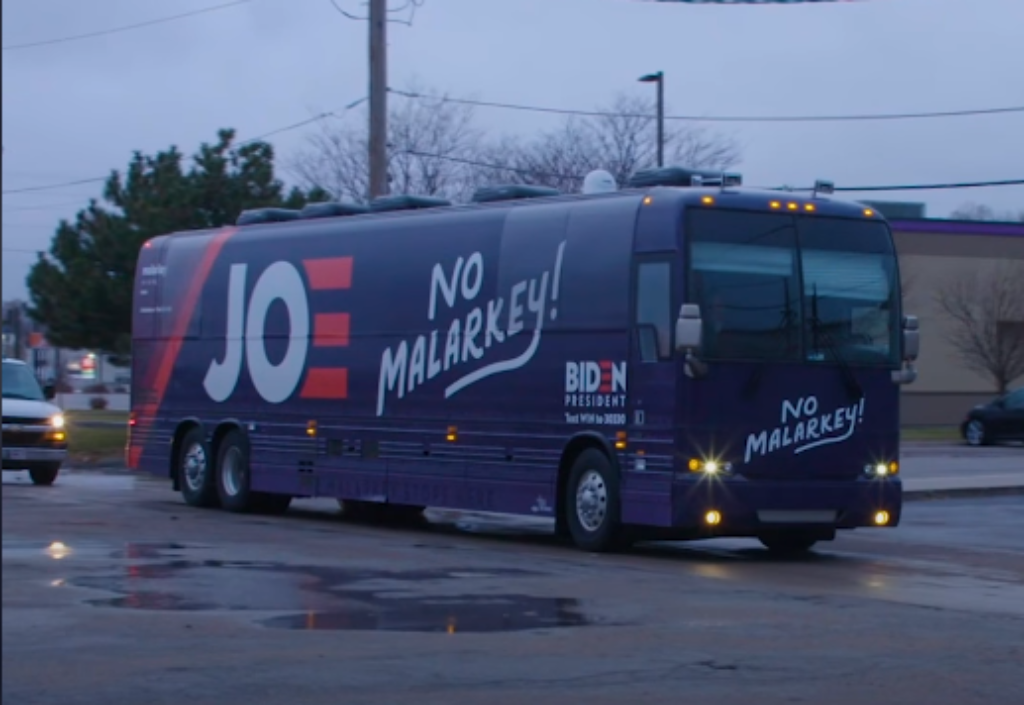 Joe Biden. Based on the success of Classic Hits, Classic Rock, Classic Hip-Hop and other formats linked to gold-based music, Obama’s Veep and long-time Senator has bet the ranch on conjuring up the good old days.
Joe Biden. Based on the success of Classic Hits, Classic Rock, Classic Hip-Hop and other formats linked to gold-based music, Obama’s Veep and long-time Senator has bet the ranch on conjuring up the good old days.
We know in radio that language and positioning matters. The Biden campaign named their recent Iowa push as “The No Malarkey Tour,” causing some young people to respond with a rousing “OK, Boomer.” Actually, as someone who’s a member of that generation, it sure didn’t resonate with me.
Geek Out Award – As those of us who are regular users of web-sharing services like Go-To-Meeting, we’ve learned you don’t have to physically “be there” in order to have a presence with your audience. The Amy Klobuchar campaign figured this out, staging three tele-town halls while she was sequestered in Washington with 99 of her not-so-best friends and Chief Justice John Roberts.
Klobuchar wisely reasoned the next best thing to being in Davenport or Cedar Falls is smart use of video conferencing. It was a demonstration to her  fans and uncommitted Iowans that she cared enough to find a way to connect with them even while she was out of state.
fans and uncommitted Iowans that she cared enough to find a way to connect with them even while she was out of state.
And another unintended positive is that her use of this technology showed her supporters she’s plugged into modern services and tools used in office settings every hour of the day. Consumers appreciate when brands use the new tools to connect and engage – just like radio stations that use the same social platforms their listeners use.
Weaseling Free Coverage Award – Amy Klobuchar takes another award, having garnered great media time – without shelling out a dime. Everyone in 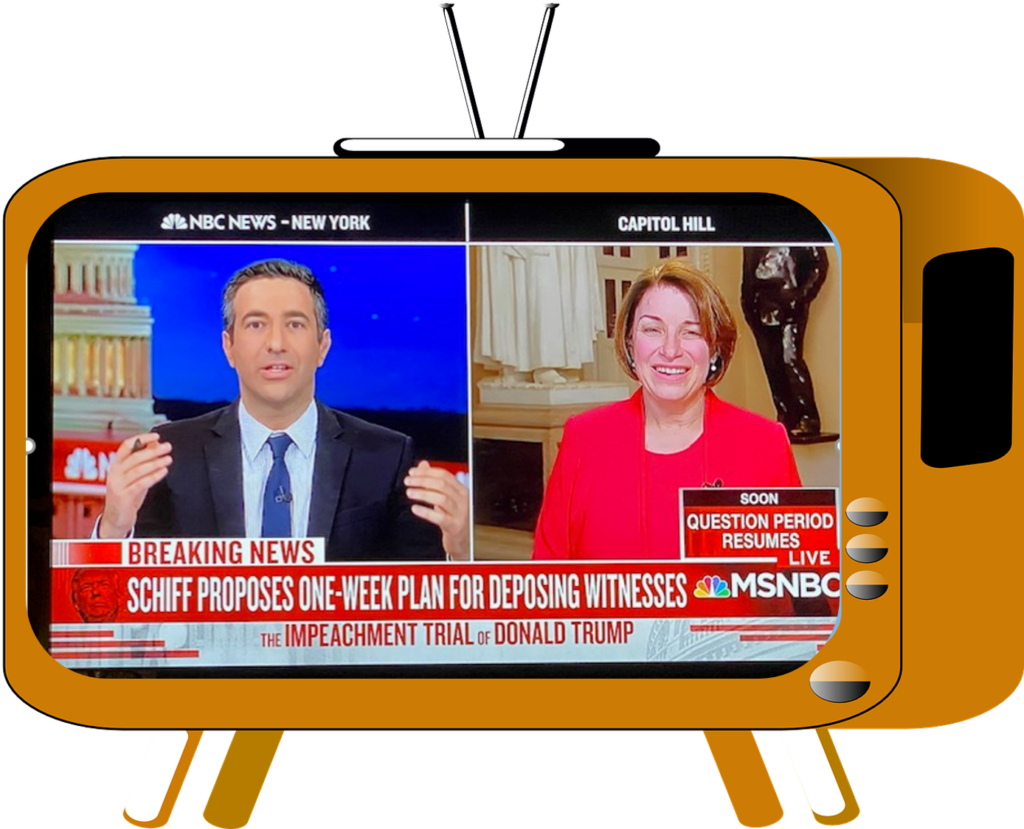 radio is well aware of the importance of free TV time. And no other candidate has pulled this off better than Senator Klobuchar.
radio is well aware of the importance of free TV time. And no other candidate has pulled this off better than Senator Klobuchar.
It seemed like during every break of the impeachment trial last week, the Minnesota Senator popped in to join panels on both CNN and MSNBC. For several of these time-outs, she managed to appear on both networks – one right after the other.
Maybe she wasn’t physically in Des Moines or Sioux City, but a lot of Iowan Democrats were undoubtedly watching the impeachment coverage. Klobuchar was usually in the right place at the right time, not just representing her party in the Senate, but also pitching her campaign.
Stick To Your Guns Award– In radio, as in politics, there’s a lot to be said for zeroing in on a position or strategy and staying the course. That’s been Bernie Sanders’ story – and it’s obviously paying off for the Vermont Senator.
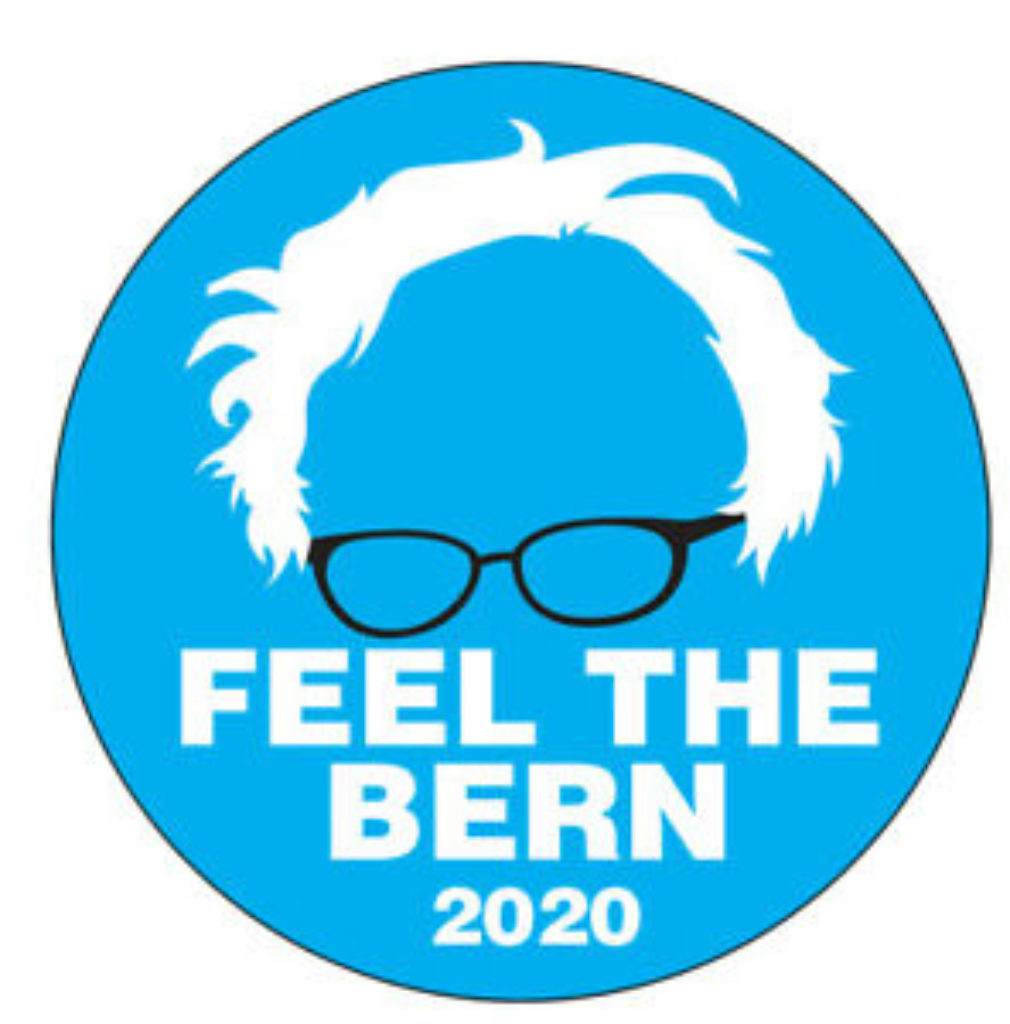 Sanders’ positions on health care, foreign wars, and other issues are well-known and historic. While many other politicians waffle, shift, pivot, flip-flop, and equivocate, for better or worse, Bernie is true to his philosophies.
Sanders’ positions on health care, foreign wars, and other issues are well-known and historic. While many other politicians waffle, shift, pivot, flip-flop, and equivocate, for better or worse, Bernie is true to his philosophies.
We know in radio the audience often appreciates stations that have stood the test of time – that has always stood for something, whether it’s the music, personalities, charity, or community service
Best Ground Game Award – This has to go to Pete Buttigieg. Yes, it helps to have funds, but nothing wins in politics like great street presence. Radio 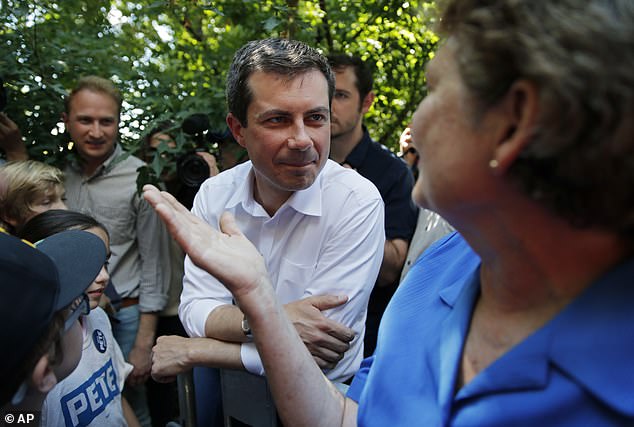 programmers, promotion directors, and sellers know this well. Mayor Pete has a lot of potential negatives to overcome – his background, age, inexperience, and the fact his highest elected position is running the fourth largest city in the state of Indiana.
programmers, promotion directors, and sellers know this well. Mayor Pete has a lot of potential negatives to overcome – his background, age, inexperience, and the fact his highest elected position is running the fourth largest city in the state of Indiana.
As the aforementioned Mr. Rosin will tell you, one of the biggest drivers that can affect the vote is whether you’ve personally met the candidate. To Iowans, this might even be a bigger factor than it is in other places.
The Also-Rans Award – There were many this year – wannabes who started out bright and even had a “moment” at one point early on, but faded out. “Roman candle candidates” like Howard Schultz (remember him?), Kamala Harris, Corey Booker, Julian Castro, Bill de Blasio, and others were able to cut through in the early innings, but couldn’t sustain their momentum.
Like a “one book wonder” in radio, true players have to bring substance, personality, uniqueness, and the ability to grab attention and get a message across for more than a few months if they’re going to win the marathon.
You may not be happy with the way the 2020 Election shakes out, any more than you did the outcome of the Super Bowl. But by watching the race like an armchair quarterback, you can learn tons about what to do – and what not to do – from these candidates duking it out in the spotlight.
As a radio friend of mine has often reminded me,
“May we get the leaders we deserve.”
- What To Do If Your Radio Station Goes Through A Midlife Crisis - April 25, 2025
- A 2020 Lesson?It Could All Be Gone In A Flash - April 24, 2025
- How AI Can Give Radio Personalities More…PERSONALITY - April 23, 2025




Leave a Reply